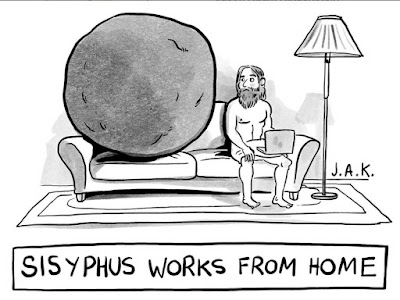Let's take a break from PM tool reviews and talk about something more fun - philosophy.
Ok, now that 99% of readers have left, we can continue. Albert Camus, one of the coolest philosophers of all time, wrote that when we, people, cannot accept the absurdity of life we commit philosophical suicide. He gave examples and called the act "the leap of faith" - it's when we deny unpredictability and chaos around us by believing something like religion, science or politics can save us from the absurd.
That's all fun and games but what it has to do with product management?
Well, pretty much everything! Building digital products is messy, uncertain, long, frustrating, error-prone, underwhelming, and just... hard. That's the reality whether we like it or not. Hence denying it = committing philosophical (or if you will - professional) suicide.
And we do it every day.
Agile! it will solve all our problems!! No, it's Lean, we all should be Lean! Nonsense, that's all for kids, what you need are TQM and Six Sigma. No, that's old school, all should be doing extreme programming now! Programming? No, ChatGPT could do the programming we'll just tell it what we want - a billion dollars!
It's so tempting to make such a leap of faith, pretend that we know what we're doing and that it actually matters. Create a plan, estimate, define, measure, explain, test, test, test. Doing those things give us an illusion of control, and allows us to justify the exchanges of goods.
But should we stop doing that? No, of course not, what else would we do? For better or for worse, we created such a game and are now too deep to stop playing. What we could do though is to stop committing philosophical suicide. Stop pretending that we can achieve certainty, remove chaos completely or have an overarching meaning.
Accepting the absurd as part of existence is liberating, it removes a lot of pressure and a lot of stress. Product managers are some of the most overworked and stressed professionals these days and that's because we try to fight the chaos. We try to remove unpredictability completely and have the perfect knowledge (of our customers, our markets and our products). This is unachievable.
Instead, we need to accept our limits. Sometimes our product will fail, our plan will need to be changed, our metrics will be incoherent, tools will let us down, stakeholders will complain and customers will jump to competitors. Also, sometimes we will be right, our product will go viral, investors will throw money at us, the best people will want to work with us, and we'll be able to buy Twitter.
Most of us will experience both, success and failure, in unequal proportions. It's important to remember that neither should define us as professionals or as people. It just defines the nature of the world we live in with all the absurdity and chaos it includes.
So paraphrasing Camus, one must imagine a product manager happy. Celebrate a successful release, support your colleagues, compete with dignity. Accept that you'll not know everything, accept you'll make mistakes or that things will not happen as you want them to. Embrace the unpredictable, absurdist complexity of the environments we operate in. Remember that what we do is infinitely easier than rolling a boulder up the hill for eternity. (even if sometimes it feels very similar)
